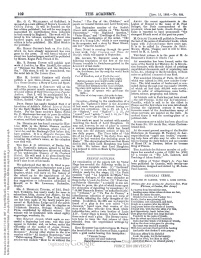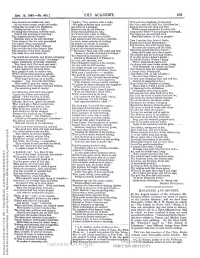ROBERT WILLIAMS BUCHANAN (1841 - 1901)
|
ROBERT WILLIAMS BUCHANAN (1841 - 1901) |
|
|
|
|
|
|
|
|
{The New Rome 1898}
297 OR, ZOLA IN A NUTSHELL.
I. AT Paris, on the Champs Elysées, Beyond, the sun was sinking downward, Herodias, by her lord attended, Then, all the glorious wedded ladies! 298 There, oiled and scented, white-waistcoated, And all the foulness and obsceneness
II. Just as I rose, with sorrow laden, Her mother, who had brought her thither, Presently, with a sigh of gladness, And on the sound foot, small and pretty, ’Twas her first day of Confirmation; 300 And she had stood with many others— While the pale mother sat beside me, And as I looked in loving wonder
III. Down to the glad green Bois I wandered, Then out I took, with fingers shrinking, “And yet God made the world, and in it “The glad deep music of Creation, 302 “One lily, wheresoever blowing, I held him sunward for a minute, PARIS, June 1883.
303 “ ‘If God would only do something,’ I said.
I. “GOD does nothing!” sigh’d the Seer,
II. Bitter creed, and creedless cry
III. Many a year the merry world
IV. Having slain the serpent creeds,
V. Nothing? Whence, then, came the Light,
VI. Nay, but who was busy too
VII. Strong and stubborn as the rock,
VIII. Wrapt around with stoic pride
IX. Not alone on wings of storm,
X. Darker grows the cloud, when we,
XI. Wouldst thou tear the clouds apart,
XII. Seekest thou the God of wrath,
XIII. See, the weary Prophet’s grave!
308
MARK now, how close they are akin, From Shakespeare to the dullest knave A little life, a little sleep, Hush then thy pomp and pride, O Man!
309 (TO CATULLUS.) “Stimulatus ubi furenti rabie, vagus animi.”
O CATULLUS, still among us strides the thing you celebrated, Ah the pity! for the Muses round his cradle sang a pæan, Ah, the pity!—oft there cometh from its lips that murmur madly
[Notes: Super alta vectus Attis celeri rate maria, The following translation is by Brendan Rau and is taken from Rudy Negenborn's Catullus site: Attis, having been conveyed over the high sees on a
310 (ON RE-READING A COLLECTION OF POEMS.)
CONFOUND your croakers and drug concoctors! None of your moping, methodistic, In he comes to you, smiling brightly, But blithely clapping you on the shoulder, And, mind you, his learning is prodigious, God’s in his Heaven, and willy nilly 311 And as for the wail of the whole world’s sorrow, When out of spirits you’re sadly lying, Full of world’s wisdom and life’s variety, A bit too chirpy, to some folk’s thinking? If he has a fault which there’s no denying, ’Tis little solace, when one is going 312 I long’d, I own, for a voice less cheery, But bless your heart, when my health grew better,
313 WITH A LOOK ROUND. (Written after first meeting the American poet,
A PILGRIM from beyond the seas, This man affirmed his disbelief But when the cruel strife was ended A full score years have passed, and still A hemlock cup? Yes, there it lies, There, in the “hub” of all creation, Daintily passing by their shop, Now I conjure thee, best of Bards, 319 Poet divine, strong soul of fire, INDIAN ROCK, PHILADELPHIA, PA.,
[Notes: The original version of ‘Socrates in Camden’ was published in The Academy (15 August, 1885) and included another verse, following verse 7: Meantime my sun-like music-maker, * Hermann Melville, author of Typee, The White Whale, &c. I sought everywhere for this Triton, who is still living somewhere in New York. No one seemed to know anything of the one great imaginative writer fit to stand shoulder to shoulder with Whitman on that continent.
The pages from The Academy with the original version are available below.] |
 |
 |
|
321
ONE handshake, Walt! while we, thy little band The dear, kind hand is cold, the grave sweet eyes No tears for thee! Tears rather, tears of shame, And so, dear Walt, thine Elder Brother passed, God bless thee, Walt! Even Death may never seize So long!—We seem to hear thy voice again, _____
or back to The New Rome - Contents
|
|
|
|
|
|
|